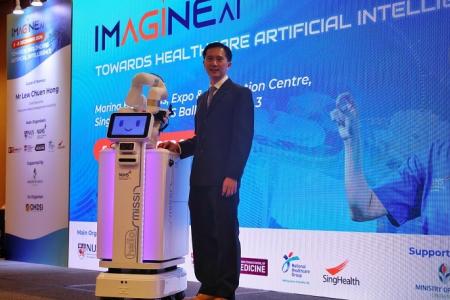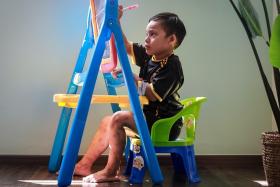AI-powered robot nurses to debut at NUH in 2025
Patients at the National University Hospital (NUH) will soon be greeted by robot nurses that can guide them around the ward, deliver medicine and give instructions on how much to take.
The robot nurses will also monitor patients’ condition from time to time, easing the load on human nurses and allowing them to focus on more complex matters.
Developed by the National University Health System (NUHS), 30 robot helpers, named Missi, will be rolled out as part of a pilot at NUH from April 2025.
The 1.5m-tall robot, with a friendly smile on its front screen, was unveiled on Dec 5 at healthtech conference Imagine AI 2024, organised by Singapore’s medical clusters and academic institutions at the Marina Bay Sands Expo and Convention Centre.
The conference, comprising a show floor and a series of panel discussions between Dec 5 and 8, drew about 600 experts, healthcare practitioners and innovations from around the world.
Powered by an artificial intelligence (AI) model developed by NUHS, Missi is able to speak to nurses and patients, provide information on advised dosage of medication, how to store it and the medication’s intended effects, said Adjunct Professor Ngiam Kee Yuan, who is head of the academic informatics office at NUHS.
Missi will guide patients around the premises, highlighting key areas such as assigned wards, restrooms and where to seek help. It can communicate in various languages, including English, Mandarin, Tamil and even Korean and local dialects, said Prof Ngiam.
The robot will be accompanied by real nurses during the pilot to ensure it is working well, Prof Ngiam added.
It will take direct instructions from nurses, as well as any other tasks that it is assigned by a fleet manager.
It will also take on deliveries between pharmacies at the hospital. Nurses can load supplies into Missi’s storage compartments and send it on its way to other facilities, taking lifts and moving between buildings in NUH, said NUHS robotics engineer Heng Meng Pei during a showcase of the robot’s capabilities.
Equipped with laser-based sensors, Missi will monitor patients’ vital signs like blood pressure and heart rate. Its image-recognition capabilities allow it to spot those at risk of falling within the ward.
Missi can facilitate teleconsultations between patients and doctors through its front display.
Mr Heng said the team hopes to improve on Missi’s design over the years, to allow it to dispense medicine by itself and organise pharmacies’ inventories.
Prof Ngiam added that Missi’s developers are also testing the system’s autonomous decision-making abilities, such as allowing the fleet of robots to organise its own schedule to deliver medicine and check on patients, based on instructions issued.
The pilot will take place at NUH as its secure indoor 5G network provides a stable testing ground for the robot fleet, said Prof Ngiam, adding that the group has plans to use Missi at NUHS’ other institutions like Ng Teng Fong General Hospital once ready.
The robot’s ability to speak is backed by Russell-GPT, a ChatGPT-like large language model developed by NUHS that is trained on clinical knowledge to serve the needs of healthcare providers securely. Among its capabilities, Russell-GPT drafts medical summaries, referrals and can transcribe conversations with patients to ease the load for clinical staff.
Among other innovations at the conference, a WhatsApp chatbot is being deployed for NUHS patients undergoing treatment for long-term chronic illnesses to send them reminders to update their doctor on their blood pressure measurements, and to exercise.
The chatbot, called Champ, is integrated with a patient’s electronic health records to provide personalised reminders to patients and help doctors collect health information from patients more conveniently.
At least 9,000 NUHS patients are enrolled on the Champ programme, said project lead Wayne Han Lee.
He added that his team plans to extend the service to more than 150,000 chronic disease patients across other hospitals and clinics here.
In another key announcement at the event, the NUS Saw Swee Hock School of Public Health will launch a new centre for AI in public health by July 2025.
The centre will focus on building new AI solutions to address public health challenges in collaboration with the World Health Organisation and regional health ministries.
It will evaluate the ethics of innovations used in healthcare, and will bring in a team of researchers and experts, said NUS Assistant Professor Feng Mengling, who is overseeing the centre’s roll-out.
Get The New Paper on your phone with the free TNP app. Download from the Apple App Store or Google Play Store now


